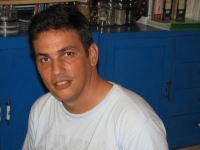Cuba's GM Maize Debate Opens Up
The entire article is available at: http://ipsnews.net/news.asp?idnews=53076
Patricia Grogg interviews agro-ecologist FERNANDO FUNES-MONZOTE*
HAVANA, Oct 6, 2010 (IPS/IFEJ) - The cultivation in several Cuban provinces of genetically modified maize, obtained by the Centre for Genetic Engineering and Biotechnology, endangers biodiversity and contradicts the government's own agricultural production plan, warns Cuban agro-ecologist Fernando Funes-Monzote.
In September, Funes-Monzote coordinated a meeting of experts concerned about transgenics with board and staff members from the National Centre for Biological Security and the Office of Environmental Regulation, one of the institutions entrusted with licensing genetically modified (GM) crops.
The experts issued a statement calling for a moratorium on GM crops until more information is available and society has a chance to debate their environmental and health effects.
The meeting was seen as the first official space open to a segment of Cuba's scientific community's concerns about the release of GM organisms into the agricultural system of this Caribbean island nation.
Q: Cultivation of this genetically modified variety, FR-Btl, began in 2008, but opinions against it predate that. Why has it taken until now to ask for a moratorium in order to analyse the advantages and disadvantages?
A: The issue was silenced, but in 2008 the alarm was sounded when this maize was planted as a test crop: one hectare that would give way to the planting of 50 hectares, as a prelude to the expansion of the crop in 2009 to 6,000 hectares across several provinces.
Until that moment, it was thought that the work with GM organisms would be kept in the laboratories until there was proof that they would not harm the environment or human health.
We now believe that a moratorium would provide the time necessary to make better-informed decisions and to reflect on the matter, with the participation of the public. Those who think this is a problem exclusive to science and that those in power have the last word are mistaken.
******
Q: What are the principal risks of applying transgenic technology under the conditions existing in Cuba?
A: The fundamental risk in the opinion of the agro-ecological movement, which is 20 years old in this country, is the expansion of a technology that threatens biodiversity and reduces the ability of native varieties to adapt, for example, to climate change, drought or changes in temperature.
Maize production in Cuba, as does all agricultural production, faces many other challenges, and it is a mistake to think that GM crops alone will increase yields.
As for potential harm to human health, it is necessary to conduct tests that prove this transgenic maize can really be consumed without danger in Cuban households. If such tests have been done, then they should be made available.
Patricia Grogg interviews agro-ecologist FERNANDO FUNES-MONZOTE*
HAVANA, Oct 6, 2010 (IPS/IFEJ) - The cultivation in several Cuban provinces of genetically modified maize, obtained by the Centre for Genetic Engineering and Biotechnology, endangers biodiversity and contradicts the government's own agricultural production plan, warns Cuban agro-ecologist Fernando Funes-Monzote.
In September, Funes-Monzote coordinated a meeting of experts concerned about transgenics with board and staff members from the National Centre for Biological Security and the Office of Environmental Regulation, one of the institutions entrusted with licensing genetically modified (GM) crops.
The experts issued a statement calling for a moratorium on GM crops until more information is available and society has a chance to debate their environmental and health effects.
The meeting was seen as the first official space open to a segment of Cuba's scientific community's concerns about the release of GM organisms into the agricultural system of this Caribbean island nation.
Q: Cultivation of this genetically modified variety, FR-Btl, began in 2008, but opinions against it predate that. Why has it taken until now to ask for a moratorium in order to analyse the advantages and disadvantages?
A: The issue was silenced, but in 2008 the alarm was sounded when this maize was planted as a test crop: one hectare that would give way to the planting of 50 hectares, as a prelude to the expansion of the crop in 2009 to 6,000 hectares across several provinces.
Until that moment, it was thought that the work with GM organisms would be kept in the laboratories until there was proof that they would not harm the environment or human health.
We now believe that a moratorium would provide the time necessary to make better-informed decisions and to reflect on the matter, with the participation of the public. Those who think this is a problem exclusive to science and that those in power have the last word are mistaken.
******
Q: What are the principal risks of applying transgenic technology under the conditions existing in Cuba?
A: The fundamental risk in the opinion of the agro-ecological movement, which is 20 years old in this country, is the expansion of a technology that threatens biodiversity and reduces the ability of native varieties to adapt, for example, to climate change, drought or changes in temperature.
Maize production in Cuba, as does all agricultural production, faces many other challenges, and it is a mistake to think that GM crops alone will increase yields.
As for potential harm to human health, it is necessary to conduct tests that prove this transgenic maize can really be consumed without danger in Cuban households. If such tests have been done, then they should be made available.
*This story is part of a series of features on biodiversity by Inter Press Service (IPS), CGIAR/Biodiversity International, International Federation of Environmental Journalists (IFEJ), and the United Nations Environment Program/Convention on Biological Diversity (UNEP/CBD) -- all members of the Alliance of Communicators for Sustainable Development (www.complusalliance.org). (END)


0 Comentarios:
Publicar un comentario
Suscribirse a Comentarios de la entrada [Atom]
<< Página Principal